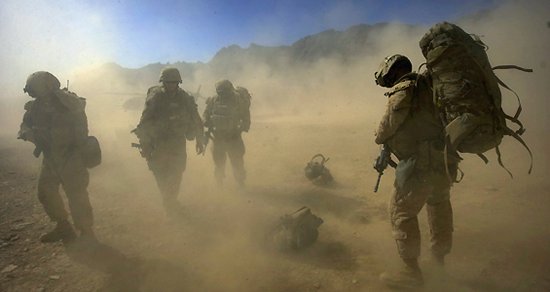
By Sarah Lazare
The call for over 30,000 more troops to be sent to Afghanistan is a travesty for the people of that country who have already suffered eight brutal years of occupation.
It is also a harsh blow to the US soldiers facing imminent deployment.
As Barack Obama, the US president, gears up for a further escalation that will bring the total number of troops in Afghanistan to over 100,000, he faces a military force that has been exhausted and overextended by fighting two wars.
Many from within the ranks are openly declaring that they have had enough, allying with anti-war veterans and activists in calling for an end to the US-led wars in Iraq and Afghanistan, with some active duty soldiers publicly refusing to deploy.
This growing movement of military refusers is a voice of sanity in a country slipping deeper into unending war.
The architects of this war would be well-advised to listen to the concerns of the soldiers and veterans tasked with carrying out their war policies on the ground.
Many of those being deployed have already faced multiple deployments to combat zones: the 101st Airborne Division, which will be deployed to Afghanistan in early 2010, faces its fifth combat tour since 2002.
"They are just going to start moving the soldiers who already served in Iraq to Afghanistan, just like they shifted me from one war to the next," said Eddie Falcon, a member of Iraq Veterans Against the War (IVAW), who served in Iraq and Afghanistan.
"Soldiers are going to start coming back with Post-Traumatic Stress Disorder (PTSD), missing limbs, problems with alcohol, and depression."
Many of these troops are still suffering the mental and physical fallout from previous deployments.
Rates of PTSD and traumatic brain injury among troops deployed to Iraq and Afghanistan have been disproportionately high, with a third of returning troops reporting mental problems and 18.5 per cent of all returning service members battling either PTSD or depression, according to a study by the Rand Corporation.
Marine suicides doubled between 2006 and 2007, and army suicides are at the highest rate since records were kept in 1980.
Resistance in the ranks
US army soldiers are refusing to serve at the highest rate since 1980, with an 80 per cent increase in desertions since the invasion of Iraq in 2003, according to the Associated Press.
These troops refuse deployment for a variety of reasons: some because they ethically oppose the wars, some because they have had a negative experience with the military, and some because they cannot psychologically survive another deployment, having fallen victim to what has been termed "Broken Joe" syndrome.
Over 150 GIs have publicly refused service and spoken out against the wars, all risking prison and some serving long sentences, and an estimated 250 US war resisters are currently taking refuge in Canada.
This resistance includes two Fort Hood, Texas, soldiers, Victor Agosto and Travis Bishop, who publicly resisted deployment to Afghanistan this year, facing prison sentences as a result, with Bishop still currently detained.
"There is no way I will deploy to Afghanistan," wrote Agosto, upon refusing his service last May. "The occupation is immoral and unjust."
Within the US military, GI resisters and anti-war veterans have organised through broad networks of veteran and civilian alliances, as well as through IVAW, comprised of Iraq and Afghanistan veterans.
This organisation, which is over 1,700 strong, with members across the world, including active-duty members on military bases, is opposed to the wars in Iraq and Afghanistan and openly supports GI resistance.
"Iraq Veterans Against the War calls on Obama to end the war in Afghanistan (and Iraq) by withdrawing troops immediately and unconditionally," wrote Jose Vasquez, the executive director of IVAW, in a December 2 open letter.
"It's not time for our brothers and sisters in arms to go to Afghanistan. It's time for them to come home."
No clear progress
GI coffee houses have sprung up at several military bases around the country. In the tradition of the GI coffee houses of the Vietnam war era, these cafes provide a space where active duty troops can speak freely and access resources about military refusal, PTSD, and veteran and GI movements against the war.
"Here at Fort Lewis, we've lost 20 soldiers from the most recent round of deployments," said Seth Menzel, an Iraq combat veteran and founding organiser of Coffee Strong, a GI coffee house at the sprawling Washington army base.
"We've seen resistance to deployment, mainly based on the fact that soldiers have been deployed so many times they don't have the patience to do it again."
As the occupation of Afghanistan passes its eighth year, with no clear progress, goals that remain elusive, and a high civilian death count, this war is coming to resemble the Iraq war that has been roundly condemned by world and US public opinion.
The never-ending nature of this conflict belies the real project of establishing US dominance in the Middle East and control of the region's resources, at the expense of the Afghan civilians and US soldiers being placed in harm's way.
The voices of refusal coming from within the US military send a powerful message that soldiers will not be fodder for an unjust and unnecessary war. By withdrawing their labour from a war that depends on their consent, these soldiers have the power to help bring this war to an end, as did their predecessors in the GI resistance movement against the Vietnam war.
And the longer the war in Afghanistan drags on - the more lives that are lost and destroyed - the more resistance we will see coming from within the ranks.
Sarah Lazare is an anti-militarist and GI resistance organiser with Dialogues Against Militarism and Courage to Resist. She is interested in connecting struggles for justice at home with global movements against war and empire.



